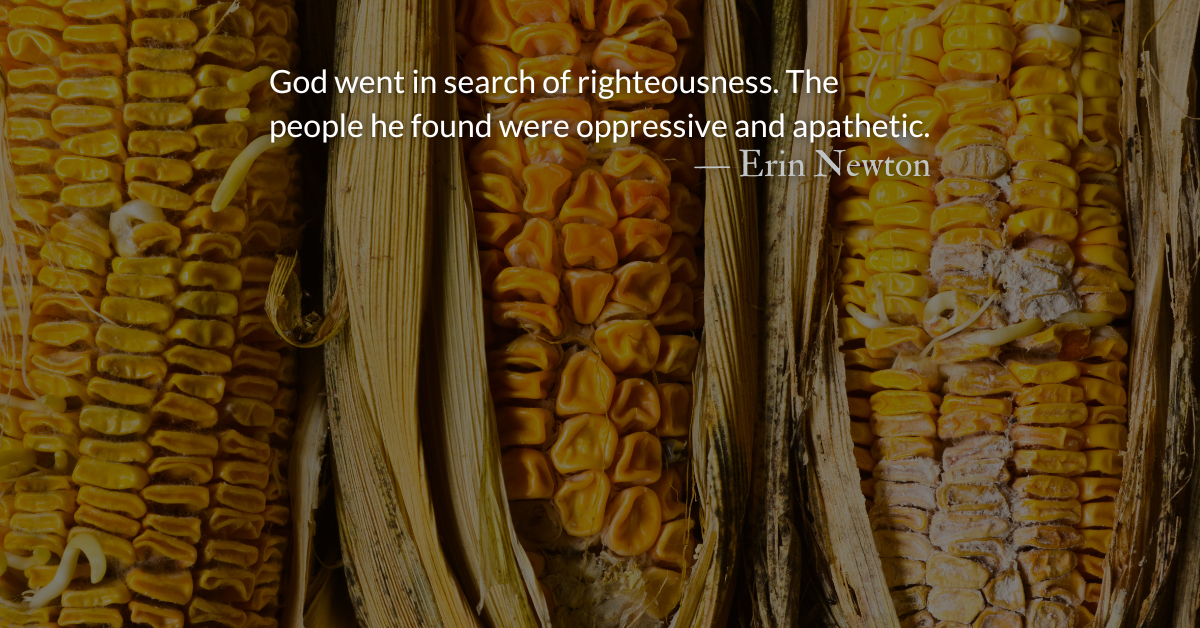Scripture Focus: Isaiah 5.1-2, 4
1 I will sing for the one I love
a song about his vineyard:
My loved one had a vineyard
on a fertile hillside.
2 He dug it up and cleared it of stones
and planted it with the choicest vines.
He built a watchtower in it
and cut out a winepress as well.
Then he looked for a crop of good grapes,
but it yielded only bad fruit.
…
4 What more could have been done for my vineyard
than I have done for it?
When I looked for good grapes,
why did it yield only bad?
Reflection: Bad Crop
By Erin Newton
From childhood, we learn about the world through stories. The best stories engage our emotions and immerse us within the narrative. Jesus was a skilled storyteller and used parables to explain things about morality and ethics. God has always spoken to us through language and images we can easily understand.
Anyone who has attempted growing vegetables or fruit trees will resonate with the parable in Isaiah 5. It is a painful story of the beloved’s effort to cultivate a garden only to have bad fruit emerge. The rhetorical question, “What more could have been done?” implies that God knows that his nurture, care, protection, blessing, and love for the vineyard were sufficient. The bad fruit is antithetical to the preparation and cultivation. Is God a poor gardener? Somehow, did a drought sneak up on him and ruin the crop? Certainly not!
Like Jesus often did with his disciples, Isaiah explains the parable. The vineyard is the nation, the people are the vines, and the bad fruit is injustice. In this parable, God has already explained that he did all that was needed to provide security and blessing for Israel. In return, they ought to be beacons of righteousness.
A counselor once told me, that when you are feeling big emotions (fear, grief, anxiety, anger, etc.) it is normal to instinctively respond by trying to lay blame somewhere else. Hardship was coming to Israel and, when the pain began, they would likely try to blame God.
Yet, Israel was responsible for the judgment they endured. God went in search of justice. The people he found were violent. God went in search of righteousness. The people he found were oppressive and apathetic.
Where Israel failed, we have the opportunity to bear good fruit: love, joy, peace, forbearance, kindness, goodness, faithfulness, gentleness, and self-control (Galatians 5.22-23). It is easier to recognize when we are bearing bad fruit by looking for the opposites: hate, suffering, chaos, impatience, rudeness, malice, abrasiveness, indulgence, etc.
The remedy for bad vines is to prune those branches and toss them into the fire. We have hope in our ability to bear good fruit through the work of Jesus. He assured us that the key to fruitfulness is abiding in him. There is nothing left undone by God in order for his vineyard to be productive and good. It is now our response that is our responsibility.
Divine Hours Prayer: The Refrain for the Morning Lessons
Let not those who hope in you be put to shame through me, Lord God of hosts; let not those who seek you be disgraced because of me. — Psalm 69.7
Today’s Readings
Isaiah 5 (Listen – 4:48)
Matthew 19 (Listen – 4:04)
Read more about Cultivation Requires Planning
No park or garden is “natural.” Even the garden of Eden was planted by the Lord…We need to follow his example of supernatural cultivation.
Read more about Cultivation Starts With Destruction
Cultivation often begins with the smell of fire, the wielding of sharpened metal tools, and the sounds of chainsaws.







